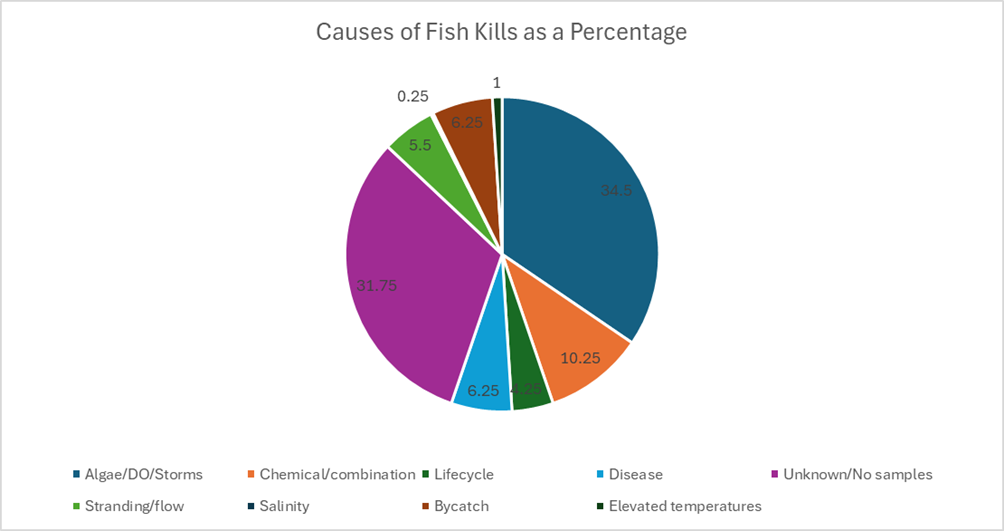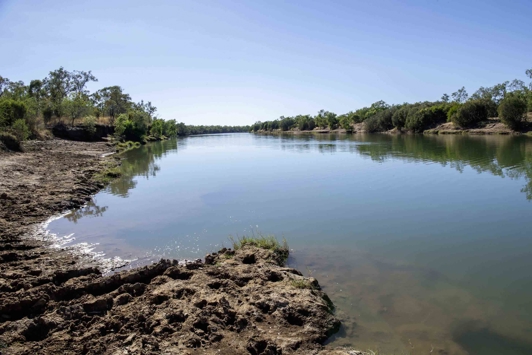If you see a fish kill, please report it immediately. Our officers have been trained to collect fish and water samples using appropriate safe methods and equipment. The best way the public can help is to immediately report fish kills to the FishWatch 24/7 reporting service – 1800 815 507.
This allows first responders a higher chance of collecting fresh samples suitable for testing to help work out the cause of the fish kill. It also enables a quick response by authorities to prevent exposure by other water users.
Fish kills are often the result of natural events and can occur anywhere in Western Australia’s freshwater or marine environments, at any time of the year. Most occur due to fluctuations in the natural environment with the most common cause being algal blooms and resulting water quality issues such as low oxygen or production of toxins.
Department of Health advice regarding fish kills
- Do not swim in areas of water with large numbers of dead and decomposing fish because they may contain high levels of bacteria and have an objectionable odour.
- Do not to fish in water with large numbers of dead fish.
- Temporarily do not collect or consume fish or shellfish from the waters near a fish kill.
- Do not collect and use dead fish for bait or consumption because of the risk of high levels of bacteria or the potential to spread diseases.
- Do not allow pets and other animals to come into contact with dead or decomposing fish either in the water or on shore.
Reasons for fish kills
Fish kills can occur due to a wide range of factors including:
- environmental factors such as changes in salinity, temperature, acidity levels, dissolved oxygen levels and significant algal growth
- natural events such as part of the lifecycle of the species in question
- parasites and pathogens that contribute to disease outbreaks in fish populations
- pollutants including pesticides, chemicals and sewage.
Fish kills can be due to one or more factors, usually in combination. In many fish kill events the cause is unknown as the environmental conditions change so quickly and there is often only a short window in which to collect quality samples.
Response to fish kills
DPIRD is responsible for responding to fish kill events that occur in the ocean. When necessary we work with other state government departments, local government authorities and other agencies to investigate fish kills in other aquatic ecosystems.
The Department of Water and Environmental Regulation (DWER) manages investigations of fish kills that occur in estuaries, rivers and naturally occurring inland water bodies.
The Department of Biodiversity, Conservation and Attractions (DBCA) manages investigations of fish kills that occur in the Swan Canning Riverpark.
The combined efforts of DPIRD, DWER and DBCA have resulted in responses to an average of 24 fish kills per year since 2010. The earlier we hear about fish kill events, the better chance we have of responding and taking suitable samples that will help us establish what the cause might be.
The earlier the department is informed about fish kill events, the better chance we have of responding to and taking suitable samples that help us establish the cause. Investigating the cause of fish kills helps us to better understand the dynamics of these complex ecosystems and improve the management and care of our waterways and environment.

Part of a bigger picture
We share information from fish kill investigations with the WA Department of Health to help protect human health. This collaboration is part of a One Health approach, which emphasises the interconnected stewardship of fish resources, the environment, and public health.
By integrating data across these areas, we aim to safeguard both ecological and human well-being.
Investigating fish kills is a crucial component of Australia's early detection system for aquatic diseases, particularly those that may have a significant impact on our aquaculture industries or impact food safety and international trade.
Previous fish kills
Update:
Investigations have continued into a fish kill involving several hundred puffer fish at Onslow.
While the event may have been associated with environmental factors, this is not yet confirmed. The test results and involvement of a single type of fish rule almost certainly rule out a toxic algal bloom. The deaths of a single type of fish almost certainly excluding a pollution event.
No harmful algal bloom algae were detected in the collected water samples and there were also low levels of other algae unlikely to impact fish.
However, because the puffer fish observed and collected were dried out, the fish kill event appears to have occurred sometime before the water samples were collected.
The collected dried-out fish samples were unsuitable for pathology analysis but are being sent to the WA Museum for further checks.
While the fish kill has passed, any remaining dead puffer fish may continue to present a poisoning risk to dogs so pets should be kept away.
If further kills occur, people are urged to stay safe by following the general Department of Health advice.
End of update.
Investigations have begun into a fish kill involving several hundred puffer fish at Onslow, between Beadon Creek and Four Mile Creek. Department of Primary Industries and Regional Development (DPIRD) officers are investigating the event in conjunction with staff from the Shire of Ashburton, aiming to collect information and samples for analysis.
While the event may be associated with environmental factors, this is not yet confirmed. The involvement of a single type of fish almost certainly rules out a pollution event or toxic algal bloom. The dead puffer fish also present a poisoning risk to dogs so pets should be kept away from these areas. The shire has also been removing dead fish to decrease this risk.
Updates will be issued when further information becomes available. In the meantime, people are reminded to stay safe around fish kills and follow this general Department of Health advice.
- not to swim in areas of water with large numbers of dead and decomposing fish because they may contain high levels of bacteria and have an objectionable odour;
- not to fish in water with large numbers of dead fish;
- temporarily not to collect or consume fish from the waters near a fish kill;
- not to collect and use dead fish for bait or consumption because of the risk of high levels of bacteria; and
- not to allow pets and other animals to come into contact with dead or decomposing fish either in the water or on shore.
Fish kills in open ocean areas may provide less evidence of a direct cause and we explore all possible explanations. It may not be possible to identify a single definitive cause, but every effort is made to establish probable factors.
Contact us
-
FishWatch 24-hour hotline

